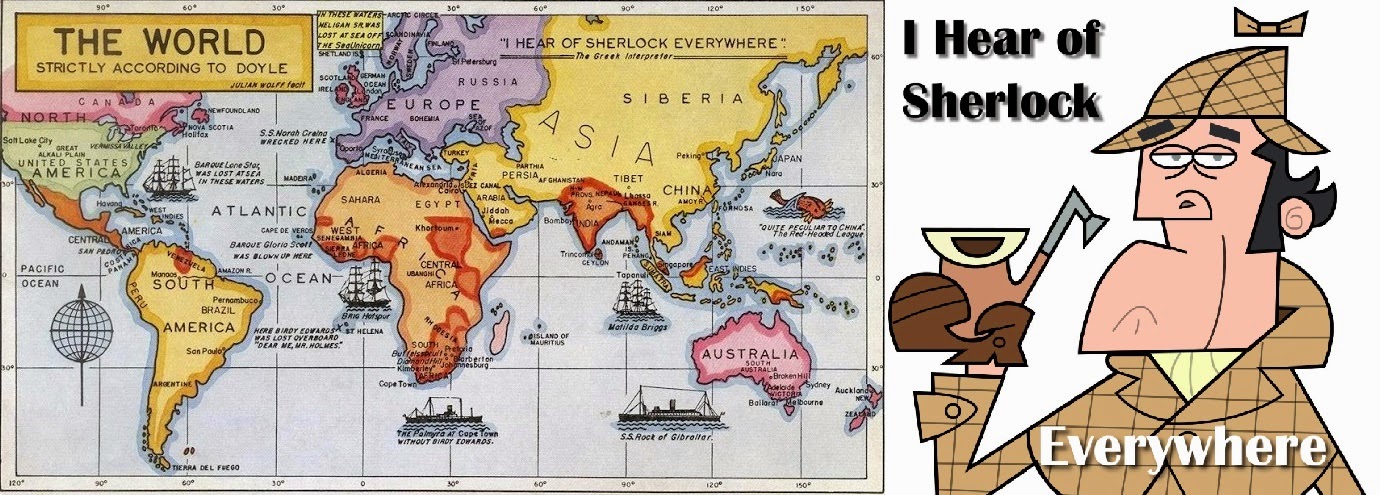"the dual nature alternatively asserted itself" [REDH]
The episode has aired but the dust has far from settled. The Sherlock special titled The Abominable Bride
So, if you'll allow me to enter my own mind palace for a minute, I will write this review from two perspectives of my personality. On one side of my palace is the Sherlock Fan, the lover of the new series and an advocate for Benedict Cumberbatch representing this generation's Sherlock Holmes. on the other side is the stalwart Holmes Purist, the believer in upholding the Canon and the traditional Holmes. I asked both versions of myself for their opinions on the episode.
Holmes Purist: The keyword for The Abominable Bride was abominable. What fans were led to believe they were getting was a self contained Victorian episode of the show Sherlock taking place in 1895 yet connecting to the ending of Series 3
Sherlock Fan: Nonsense! You can't judge the episode on your expectations for what it was supposed to be, only for what it is, and this was an excellent episode of the show Sherlock with the added bonus of the Victorian segments. The episode finally put Moriarty to rest. He is dead and there will be a new villain challenging Holmes in Series 4. It also had some of the wittiest dialogue yet for the show. As you said HP, the opening scene of Holmes meeting Watson was perfectly executed and the air date of January 1st, 135 years after the duo met was spot on brilliant. The complaining of Mrs. Hudson that she's not in the Canon enough and Watson's maid that she's not even mentioned in the Canon was hilarious, as was the banter between Holmes and the corpulent Mycroft over the elder's life expectancy. The case itself was a well written Holmesian case with Holmes acting as Holmes and Watson acting as Watson. What is there to complain about?
HP: Plenty! First off, Holmes and Watson were not Holmes and Watson. Watson would never talk with Holmes about his romantic aspirations while on a stake out. Second, the obese Mycroft was just a poor special effect which was so distracting as to make it hard to pay attention to the character's dialogue. Third, and most offensive, was the case. It was far too easy to solve. After Mycroft explained that their side had to lose this one, it was fairly obvious that since he was talking to men, he was referencing women, and not just any women, but the suffragists mentioned by Mary Watson earlier in the episode. After that, the story pretty much wrote itself and there were no more surprises in the Victorian parts of the episode. Let's not even get into the rip off of Inception
SF: So what if the mystery was obvious? We don't read Holmes stories and watch Sherlock for the mystery, but rather for the characters. As I said earlier, Holmes and Watson were wonderful in this and the humor was perfect. Watson's 'potato' line in the Diogenes Club was classic. And I found the suffragists in this episode refreshing. One of the largest complaints about the show Sherlock is its sexism particularly in their depiction of Irene Adler in "A Scandal in Belgravia
HP: I don't think making the suffragists into purple klansmen does anything to help with the sexism complaints. Come now, does this really make up for Irene Adler not only losing to Holmes because he feels her pulse (Can we get anymore sexist than that?), but also that he has to save her life?
SF: Okay, I concede that you are correct about Adler, but that is a different story line. This one was an excellent addition to the show Sherlock. I enjoyed the conclusion, and I like how Watson kicks Moriarty over the falls and out of Holmes's mind. I don't think this could have been any better. I give the episode five stars.
HP: This was a travesty, an affront to Sir Arthur Conan Doyle, and it does nothing to keep the spirit of Holmes alive. I give the episode one star only.
I think both of my personalities have valid points. To be fair, I added the two reviews together and divided by two giving my final opinion of three stars, not a glowing review, but enough to say at least a part of me enjoyed it.
Derrick Belanger is the author of the #1 bestselling book in its category Sherlock Holmes: The Adventure of the Peculiar Provenance
--


0 comments:
Post a Comment